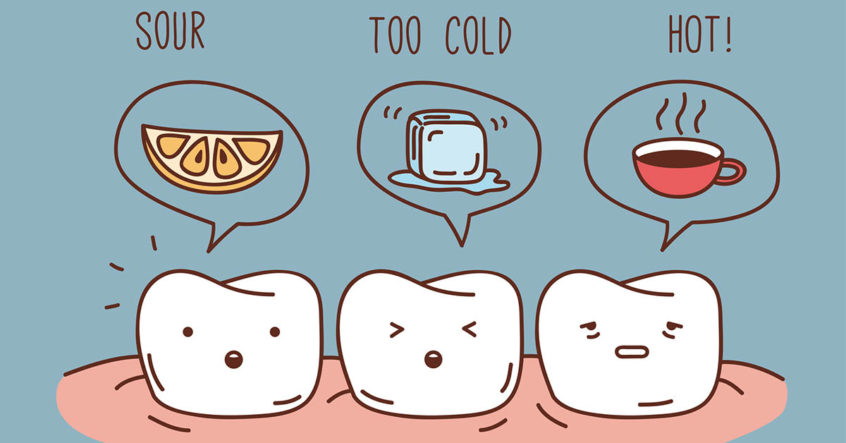Have you ever taken a bite out of an ice cream cone or tried to sip a hot cup of coffee only to be met with a quick shooting pain in your tooth (or teeth)? Do you love lemons but can’t eat citrus fruits because of the pain it causes? If you’re nodding your head “yes” to these questions, you’re not alone. The American Academy of Dentistry estimates that nearly 40 million Americans have experienced some degree of tooth sensitivity. Ouch! The good news is that if you do have sensitive teeth, there are a few things you can do.
What is tooth sensitivity?
First, it’s important to pinpoint what is and what isn’t tooth sensitivity. Tooth sensitivity is not a general toothache, and it is not pain from chewing. Tooth sensitivity can be defined as:
- Pain when eating acidic foods: Note that this is different than chewing. In the case of tooth sensitivity, it is the type of food that is problematic, not the actual act of chewing.
- Pain when drinking cold beverages: iced coffee, iced tea, and even really cold water
- Pain when drinking hot beverages: coffee, tea, or even hot broth and soups
- Pain that can be described as sharp or shooting
Causes of tooth sensitivity
If your tooth enamel wears down, there is a chance that dentin is exposed. When dentin is exposed, you are more likely to experience sensitivity. Why? The ADA weighs in: “When dentin loses its protective covering [enamel], the tubules allow heat and cold or acidic or sticky foods to stimulate the nerves and cells inside your tooth.” There are many causes of tooth sensitivity due to enamel loss:
- Receding Gums
- Tooth decay
- Reactions to tooth whitening agents
- Brushing too aggressively
- Using products that are too abrasive
- Bruxism
- Too much plaque
What to do for sensitive teeth?
The first and most important step in addressing tooth sensitivity is scheduling an appointment with your dentist to determine the cause of your sensitivity. Once you have a proper diagnosis, your dentist will be able to better guide you in ways to treat the sensitivity. For instance, if your tooth sensitivity is caused be a deep decay or cavity, the best solution addresses the decay. Perhaps you will need a filling or a root canal, but chances are pretty good that once the decay is taken care of, you’ll feel much better.
Depending on the cause of your sensitivity, you can try these tricks as well:
- Use a desensitizing toothpaste: These kinds of toothpaste are specifically designed to combat tooth sensitivity. These are ideal for treating sensitivity not caused by decay. If your teeth are particularly sensitive to hot/cold beverages and citrus, desensitizing toothpaste can help “desensitize” your teeth so that you can enjoy some of your favorite foods and beverages.
- Change your whitening habits: Some individuals find that the whitening agents used in teeth whitening treatments can irritate the gums and cause sensitivity. If you find that over-the-counter whitening strips cause sensitivity, you don’t have to abandon your hopes of having a bright smile. Changing your whitening method from daily exposure to the whitening agent (like in the OTC whitening strips) to an in-office treatment, your teeth can be brightened without exposing your teeth to a whitening agent on a daily basis. For instance, with Zoom whitening treatments, your teeth are only exposed to the whitening agent for about an hour. Compare that to whitening strips: 30 minutes twice a day for 10 days: 600 minutes!
- Change your brushing habits: If your tooth sensitivity is caused by aggressive brushing, you can a few simple changes. Make sure you are using a soft-bristled brush with a non-abrasive toothpaste. Although it may seem like “more is better” be sure to only brush your teeth twice a day. Brushing too much or too vigorously can cause your enamel to wear down and expose your dentin. Brush firmly but gently.
- Read your labels: Sodium pyrophosphate is an ingredient is tartar control toothpaste that is well-known for causing sensitivity.
- Treat underlying medical conditions: If your tooth enamel is worn down from medical conditions like acid reflux, the best course of action is to treat the underlying reflux. If bruxism (better known as teeth grinding) is the cause of your sensitivity, your dentist can create a special night guard for you that will protect your teeth from grinding and wearing down your enamel. If gum disease is causing your sensitivity, it’s especially important to seek treatment. If gum disease goes untreated for too long, you are at risk of losing bone and teeth.
- Removing excess plaque: If too much plaque builds up, it may eventually cause you to lose some enamel, which then causes sensitivity. For this reason, it’s important to continue to visit your dentist for your regular cleanings.
Is it time to see the dentist?
If your tooth sensitivity continues even after making a few lifestyle changes, it may be time to see the dentist to rule out other dental issues like cavities or gum disease. If your sensitivity is accompanied by swelling, pain when chewing, or visible holes in your teeth, schedule an appointment with your dentist as soon as possible.
Let us help you!
Contact us today to book an appointment!
Teeth sensitivity can occur for a variety of reasons receding gums can cause Dentin Hypersensitivity. Sensitive teeth symptoms include being sensitive to hot and cold food and drinks as well as toothaches. How do you stop sensitive tooth pain? Some of the things mentioned in there include avoiding highly acidic foods as well as desensitizing your teeth using sensitive toothpaste options. Where does your dentist come in? There are few dental procedures that can be done to help your sensitive teeth depending on the reason for the sensitivity.

